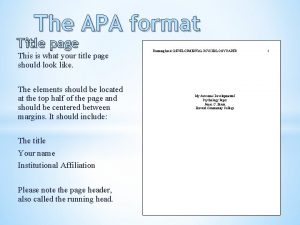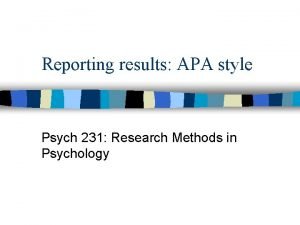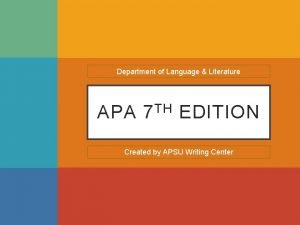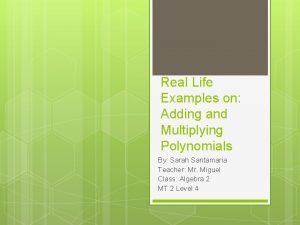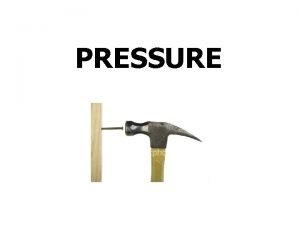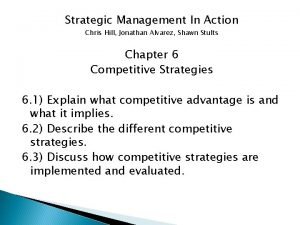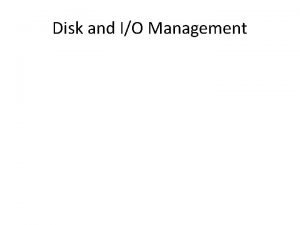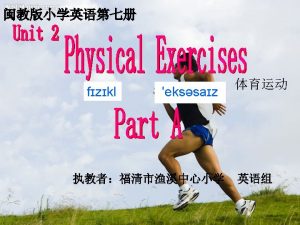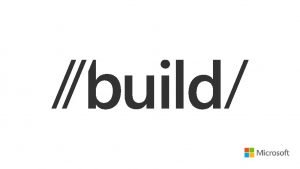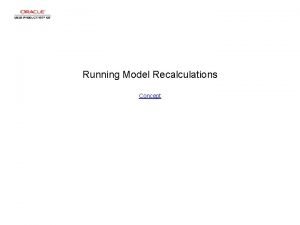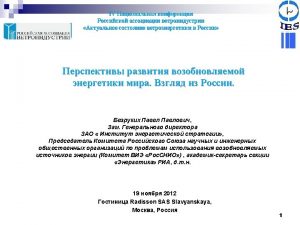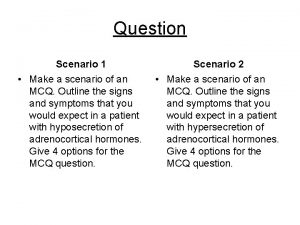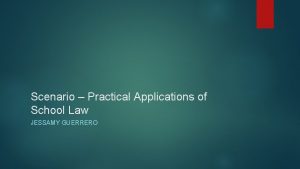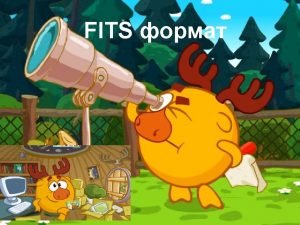Running Head SCENARIO Scenario Practical Applications of School











- Slides: 11

Running Head: SCENARIO Scenario: Practical Applications of School Law Jacqueline Suarez Barry University

Scenario #1: Create a scenario that identifies and applies state requirements for students to participate in interscholastic or extracurricular activities. As the school year begins, students are eager to sign up and/or try out for extracurricular activities. A student decided to try out for football. He was also interested in playing basketball. His friend enjoys photography, so the year book club would be ideal for him. They inquired about these various activities. The student was told that a form must be signed by him and his parents prior to being eligible. However, his friend did not need to. The form stated that both the student and the parent consented to random drug tests by the school. The boy and his parents did not agree with him being tested for drugs. They immediately called to schedule a meeting with the principal of the school. The parents told the principal that they objected to the consent form and refused to sign it. They claimed that the school did not have any reason to believe that the boy used drugs. The principal told the family that he could not participate in sports if the form was not signed. Can school officials require students to be subjected to drug testing to participate in extracurricular activities?

Interscholastic or Extracurricular Student Activities • Interscholastic or extracurricular student activities are school authorized activities that take place outside of the regular instructional day. • The purpose of interscholastic or extracurricular activities is to assist students in further developing their social and intellectual skills. Some of the activities include athletics, chorus, marching band, and academic clubs.

Statute 1006. 15 Title XLVIII K-20 Education Code Chapter 1006 Support for Learning • Student standards for participation in interscholastic and intrascholastic extracurricular student activities.

Court Case: Board of Education vs Earls • Board of Education vs. Earls, 536 U. S. 822 (2002), was a United States Supreme Court case in which the Court upheld the constitutionality of mandatory drug testing by public schools of students participating in extracurricular activities. The legal challenge to the practice was brought by two students, Lindsay Earls and Daniel James, and their families against the school board of Tecumseh Oklahoma, alleging that their policy requiring students to consent to random urinalysis testing for drug use violated the Fourth Amendment to the United States Constitution. • Fourth Amendment prohibits unreasonable searches and seizures and requires any warrant to be judicially sanctioned and supported by probable cause • In a majority opinion delivered by Justice Clarence Thomas, the Court held that students in extracurricular activities had a diminished expectation of privacy, and that the policy furthered an important interest of the school in preventing drug use among students. This rationale was based on the precedent Vernonia School District 47 J vs. Acton, which allowed drug testing for athletes. Justice Stephen Breyer filed an opinion concurring in the court’s judgment. • The Student Activities Drug Testing Policy adopted by the Tecumseh, Oklahoma School District (School District) requires all middle and high school students to consent to urinalysis testing for drugs in order to participate in any extracurricular activities. Two Tecumseh High School students and their parents brought suit, alleging that the policy violates the Fourth Amendment. The District Court granted the School District summary judgment. In reversing, the Court of Appeals held that the policy violated the Fourth Amendment. The appellate court concluded that before imposing a suspicionless drug-testing program a school must demonstrate some identifiable drug abuse problem among a sufficient number of those tested, such that testing that group will actually redress its drug problem, which the School District had failed to demonstrate

Landmark Supreme Court Case Board of Education of Independent School District #92 of Pottawatomie County vs. Earls (2002) Holding: Random drug tests of students involved in extracurricular activities do not violate the Fourth Amendment. In Vernonia School District vs. Acton (1995), the Supreme Court held that random drug tests of student athletes do not violate the Fourth Amendment's prohibition of unreasonable searches and seizures. Some schools then began to require drug tests of all students in extracurricular activities. The Supreme Court in Earls upheld this practice. Under that regimen in Vernonia, Oregon, student athletes were required to submit to random drug testing before being allowed to participate in sports. During the season, 10% of all athletes were selected at random for testing. The Supreme Court held that although the tests were searches under the Fourth Amendment, they were reasonable in light of the schools' interest in preventing teenage drug use. The Supreme Court upheld this practice.

Florida Law • In 1997, The Legislature statutorily created the Florida High School Activities Association (FHSAA) to oversee interscholastic or extracurricular athletic programs. • Federal law authorizes school districts to conduct student testing for drugs including anabolic steroids.

Funding Student Drug Testing • In his January 20, 2004 State of the Union Address, President George W. Bush proposed funding • Program Type: Discretionary/Competitive Grants • This program awards grants to Local Education Agencies (LEAs) and other public and private entities to develop and implement, or expand, school-based drug testing programs for students. • The projects funded by these grants must be consistent with constitutional principles and state and federal laws and requirements regarding student drug testing, and must ensure the confidentiality of testing results. • To pay for random student drug testing, school districts can apply for federal and state grants. In Florida, a school can use Safe and Drug Free Schools grant money for student drug testing as long as it's part of a broader effort that includes such things as drug education, according to the Florida Department of Education. Otherwise, the district must pay for drug testing from its local budget.

Funding Student Drug Testing Continued… • Depending on the type of test used and the range of target drugs, individual tests can cost between $10 and $50. Funds for drug testing programs can come from any number of Federal, State, local, or private sources. • Each year, Congress provides funds through the Department of Education’s Office of Safe and Drug Free Schools, National Programs, for a variety of activities related to alcohol, drug, and violence prevention. In 2003, $2 million was provided to eight grantees nationally for student drug testing. • Local businesses may also provide financial and other kinds of support for a school’s drug testing program. • Some schools add the cost of drug testing to the student activity fees charged to parents or allocate a portion of athletic booster club funds to pay for drug tests. • Some schools “piggyback” on city or state agencies that already have contracts with drug testing companies to reduce cost of drug testing.

Evaluative Instrument • Some people believe that requiring drug testing for students participating in extracurricular activities will deter students from drug use. Others feel the required drug test treats students as suspects. Describe your position on these two perspectives. • Do you agree or disagree with drug testing students participating in extracurricular activities? Explain why or why not. • Is it equal and fair that only those students participating in competitive extracurricular activities are the ones required to test? Explain why or why not. • Does drug testing violate a student’s Fourth Amendment Rights as discussed in the case Board of Education vs. Earls? • Who pays for the student drug testing?

References BJ Productions (2014, March 12). Board of Education vs. Earls: The Result. Retrieved May 20, 2014, from http: //www. youtube. com/watch? v=s. XLi. VMg. P 824 Find Law for Legal Professionals. Retrieved from http: //caselaw. lp. findlaw. com/scripts/getcase. pl? court=US&vol=536&invol=822 Florida House of Representatives. Interscholastic Extracurricular Activities and High School Athletics: Education Fact Sheet 2010 -11. Retrieved from http: //www. myfloridahouse. gov/File. Stores/Web/House. Content/Approved/Web%20 Site/education_fact_sheets/2011/documents/201011%20 Interscholastic%20 Extracurricular%20 Activities%20 and%20 High%20 School%20 Athletics. 3. pdf Florida Trend. Testing 1 -2 -3. Retrieved from http: //www. floridatrend. com/article/11907/testing-1 -2 -3 Office of National Drug Control Policy. What You Need to Know About Starting a Student Drug-Testing Program. Retrieved from http: //www. ago. state. ms. us/wp-content/uploads/2013/07/Starting-a-Student-Drug-Testing-Program. pdf Official Internet Site of the Florida Legislature. The 2013 Florida Statutes. Retrieved from http: //www. leg. state. fl. us/Statutes/index. cfm? App_mode=Display_Statute&Search_String =&URL=10001099/1006/Sections/1006. 15. html United States Courts. Landmark Supreme Court Cases About Teens. Retrieved from http: //www. uscourts. gov/educational-resources/get-informed/supreme-court/landmark-supreme-court-casesabout-students. aspx United States Department of Education. School-Based Drug Testing Programs. Retrieved from http: //www 2. ed. gov/programs/drugtesting/faq. html
 Once upon a time, there
Once upon a time, there Running running running
Running running running Does apa have cover page
Does apa have cover page How to shorten title for running head
How to shorten title for running head Apa abstract example
Apa abstract example How do polynomials apply to real life
How do polynomials apply to real life Other practical applications of boyle's law
Other practical applications of boyle's law Practical application of biotechnology
Practical application of biotechnology Indexing head parts
Indexing head parts The attacking firm goes head-to-head with its competitor.
The attacking firm goes head-to-head with its competitor. The head of a moving head disk
The head of a moving head disk


